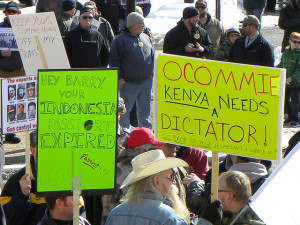
“Birther” protesters, St. Cloud, MN, 2013
Anyone who pays attention to the arguments made by conservatives (and Republicans, same thing nowadays) versus those made by liberals and Democrats knows that their respective ways of thinking and speaking is entirely different. Researchers have even found that conservative and liberal brains work very differently. But what the scientists haven’t mentioned is that you can usually identify whether someone is a liberal or a conservative by listening for one word.
The one-word difference between liberals and conservatives is:
“Believe.”
Specifically, listen for whether someone uses the word “believe” in their political discussions, in place of evidence for their arguments. If they do, they are probably conservative. Here are some examples that we often hear today:
“I believe marriage is between a man and a woman.” — This one has the added flaw of using the word “is” when what the speaker really means is “should be” or “should remain.”
“I don’t believe in climate change”/”I don’t believe climate change is caused by human activity.”
“I believe President Obama is a Kenyan/Muslim.”
“I believe that the Bible is true.”
Or how about this infamous 1994 U.S. House committee hearing, where, under questioning from Democratic Congressman Ron Wyden, the heads of the seven Big Tobacco companies each stated a variation of: “I believe that nicotine is not addictive”?
What these conservatives’ use of “believe” have in common is the absence or ignoring of facts or evidence. Conservatives will stick to their beliefs even in the face of such evidence. As Berkeley linguistics professor and Democratic framing guru George Lakoff famously wrote about the conservative mindset in his book “Don’t Think of An Elephant!”: “When the facts don’t fit the frames, the frames are kept and the facts ignored.”
Liberals, in contrast, like to cite facts and evidence, sometimes to their detriment, as folks nowadays have very short attention spans. So, for example, liberals and Democrats often mention that “97 percent of climate scientists agree that climate change is caused in large part by human activity.” Likewise, President Barack Obama expressed only partially faux anger at his recent White House Correspondents’ Dinner appearance to say that:
The science is clear. Nine out of 10 of the hottest years ever came in the last decade …. Rising seas, more violent storms …. I mean, look at what’s happening right now. Every serious scientist says we need to act. The Pentagon says it’s a national security risk. Miami floods on a sunny day, and instead of doing anything about it, we get elected officials throwing snowballs in the Senate! It is crazy! What about our kids? What kind of stupid, short-sighted, irresponsible bull–….?
So how do liberals use “believe”? Liberals and Democrats tend to use “believe” in a very different way than conservatives. For example, then-presidential candidate Barack Obama’s 2008 campaign theme, later published as a book, was “Change We Can Believe In.” But the “belief” that Obama called for was based on achieving measurable goals, such as fixing George W. Bush‘s broken economy, strengthening the middle class with a targeted tax cut, becoming energy independent, and making both early childhood and college education more accessible and affordable. More generally, liberals use the term “believe” when they say, “I can’t believe you just said that” to a conservative who spouts a fact-free talking point.
Photo by Fibonacci Blue, used under Creative Commons license. http://is.gd/2IUS84


